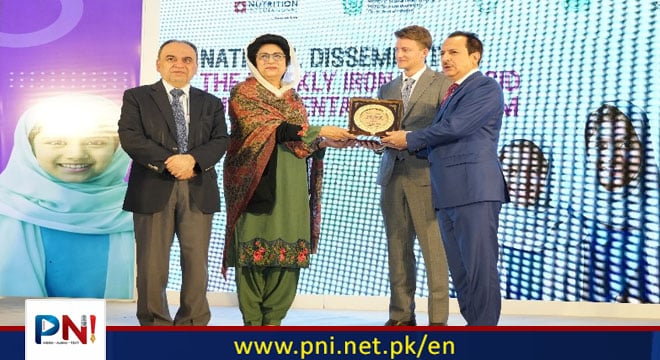ISLAMABAD, December 19, 2023: Nutrition International joined hands with the Nutrition Wing of the Ministry of National Health Services Regulations and Coordination (MoNHSR&C), Integrated Reproductive Maternal Newborn, Child Health & Nutrition Program (IRMNCH&N) Punjab and Lodhran district’s health and education authorities to pilot a school-based Weekly Iron Folic Acid Supplementation (WIFAS) program in 50 public sector schools.
The pilot project reached more than 5000 adolescent girls with the recommended scheme of WIFAS and enhanced their knowledge about nutrition and iron deficiency anaemia.
WIFAS pilot project reach and key findings of endline survey5,253 adolescent girls consumed the recommended scheme of WIFAS. 212 health workers and 550 education department staff trained on the prevention of anaemia and WIFA supplementation among adolescents in schools.
94% increase in awareness among adolescent girls on WIFAS supplements for prevention of anaemia. 86% increase in the knowledge of adolescent girls about low haemoglobin concentration as a sign of anaemia. Teachers played a significant role in influencing parents’ behavior about prevention of anaemia. An integral component of the project’s success was coordination among NGOs, the nutrition wing of MoNHSRC, and the health and education departments.
‘There’s a need for a comprehensive integrated Behaviour Change Communication Strategy including family planning, nutrition, maternal & child health, EPI, polio and all other things happening at the ground level’, said Dr. Nadeem Jan, Federal Minister for MoNHSR&C. He appreciated the efforts of the Nutrition Wing, Ministry of National Health Services Regulations & Coordination (MoNHSRC) and Nutrition International for taking initiatives aimed at improving the health and nutrition outcomes of women and adolescent girls. He tasked his Ministry to develop a special task force on Nutrition to strategize and guide Nutrition Programming in the country using a life cycle approach.
The Government of Pakistan has developed the Pakistan Adolescent Nutrition Strategy and Operational Plan (2020-2025) that includes WIFAS, however, there was a need to develop an implementation model for delivering the program in practical settings. Continuing its mandate of providing technical assistance on nutrition to the government, Nutrition International initiated the WIFAS pilot project in the Lodhran district of Punjab. The project was implemented in collaboration with the District Health Authority and District Education Authority, Lodhran along with technical oversight and leadership from the Nutrition Wing, MoNHSRC, IRMNCH&NP Primary and Secondary Health Care Department of the Government of Punjab. Besides the provision of WIFAS, the project also focused on improving the knowledge and practices of adolescent girls and their immediate influencers concerning iron deficiency anaemia through capacity building of education and health staff.
‘Girls constitute 48% of the total adolescent population in Pakistan and half of them are anaemic. Addressing their nutritional needs is critical not only for their health and wellbeing but for the generations they produce’, stated Dr. Shabina Raza, Country Director – Pakistan, Nutrition International.
Sharing the key achievements of the project, Dr. Raza said, ‘The pilot phase was successful in showcasing an operational model of implementing the WIFAS program for in-school adolescent girls and generating acceptance from all stakeholders including national, provincial, and district-level government authorities, schools, community, and beneficiaries’.
‘WIFAS pilot project has been a well-coordinated and comprehensive program with a set of activities around adolescent health and nutrition’, said Dr. Khawaja Masuood, National Coordinator Nutrition and NFA MoNHSRC. He further said that ‘Iron deficiency anaemia is one of the key public health problems faced by adolescents in Pakistan. As per the findings of the National Nutrition Survey 2018, 54.7% of the country’s adolescent girls are anaemic, with a higher prevalence in rural areas (56%) than in urban areas (53%)’, The consequences of outcomes due to Anemia and malnutrition can lead to diminished human capital and academic potential.
The project was successful in improving the nutrition outcomes of adolescent girls in the project area, through behavior change communication and enhanced their knowledge about anaemia and its prevention. Building on the successful pilot, Nutrition International has expanded the program to two new districts – Swabi in Khyber Pakhtunkhwa and Pishin in Balochistan. In its new phase in 2022-2025, the project will reach at least 60,000 adolescent girls with WIFAS and appropriate education about anaemia.
Health and nutrition are specifically ranked high among Canada’s international assistance priorities’, said Mr. Lukas Van Arragon, Second Secretary Development, Canadian High Commission Islamabad. He further said that ‘WIFAS program itself has been an existing and promising initiative because it is doing what good deployment work should do’.
The event was attended by over 80 participants including, Dr. Faisal Waheed, CEO of District Health Authority Lodhran, Dr. Fazal Majeed, Director Nutrition Khyber Pakhtunkhwa (KP), Dr. Musa, Project Director IIntegrated Health KP, Dr. Abdul Latif, District Health Officer, Swabi, Mr. Ayaz Kambho, Assistant Director Education Lodhran.
Follow the PNI Facebook page for the latest news and updates.








